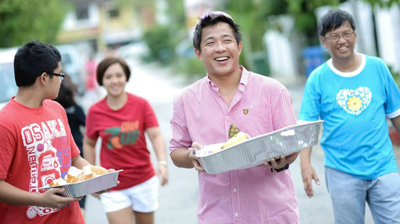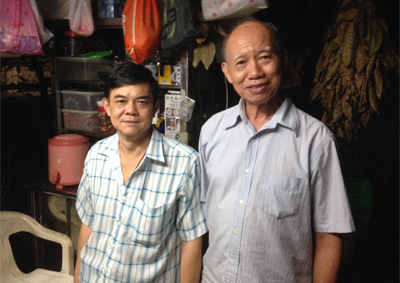
Ministry of Culture Community and Youth - Community Relations Engagement Division
- Consultation Period:
- 08 Mar 2014 - 21 Apr 2014
- Status:
- Closed
Summary
Detailed Description
ANNEX A
PUBLIC CONSULTATION PAPER
PROMOTING GOOD NEIGHBOURLINESS AND RESOLVING COMMUNITY DISPUTES
What is the Kampong Spirit? It is the spirit of mutual consideration, of neighbours knowing that even as preferences differ from household to household, there is understanding and compromise. Being friends with our neighbours and being thoughtful towards one another can help prevent conflict and smooth things over when tensions arise.
Differences between individuals have always existed and will continue to do so. The question is how we should approach these differences if they cause annoyance. Annually, public agencies receive over 70,000 complaints over noise in our neighbourhoods. In light of the above, the Government invites you to help us understand how we can encourage considerate behaviour and better manage the occasional but sometimes protracted disputes which can make life unpleasant and sour relations between neighbours.
HOW MIGHT WE ENCOURAGE GOOD NEIGHBOURLINESS AND CONSIDERATE BEHAVIOUR?

|
|---|
In some neighbourhoods, it seems that such ties are not as close. It is easy to understand why: we live in more hectic times and our living environment is denser. Neighbours who do not know each other may get more easily annoyed over noise, dripping water from laundry, obstruction of common areas, etc. Noise is particularly difficult to tackle because it is transient and people have different tolerance levels. For instance, we may not be aware that sounds carry more when it is quiet and that doing home repairs or watching television at a loud volume after 10.30pm may disrupt our neighbours' rest.
A. What would help us build closer ties with our neighbours? Using home grown herbs from their community garden at Jurong West, Mr Yeo and Mr Tan brew herbal drinks for the residents in their community every Monday, Wednesday and Friday. And guess what, all drinks are available free-of-charge! B. How can closer ties with neighbours help us deal with disputes and complaints? |
|---|
We have different lifestyles and preferences. In our dense urban environment, our preferences may result in friction and discomfort. However, discomfort need not turn into disputes.
Approaching our neighbours so as to resolve conflict is not always easy. However, if we know our neighbours well, we would be more comfortable with talking about what bothers us, like loud music blasting past 10.30pm or dripping laundry.
|
|---|
C: What would encourage us to be more mindful that some of our behaviours might annoy others? Comic courtesy of Housing & Development Board, How can we be good neighbours? 
|
|---|
WHEN SHOULD THE GOVERNMENT COME INTO THE PICTURE?
Sometimes residents decide to complain to the authorities directly, and frontline agencies are asked to intervene. When this happens, relationships between neighbours might worsen. One resident might be hurt by the loss of face. Another resident might choose to nitpick at the neighbour who made the initial complaint, starting a tit-for-tat spiral of unhappiness.
D: What kind of disputes between neighbours might we need help with? What types of interventions by public agencies might be helpful? |
|---|
------------------------- Today, mediation is a voluntary process where both parties must be willing to find a mutually-acceptable solution. But this process will have limited effectiveness if one party does not attend the mediation, as disputing parties would not have the chance to discuss the issues. ------------------------- |
|---|
Mediators help untangle disputes with complicated histories and help us understand each other's position. For disputes in our neighbourhoods, grassroots leaders in Resident's Committees can bring both parties together for informal mediation. This is particularly helpful in cases where residents may not be acquainted with the neighbour they are complaining about. When dealing with more complicated disputes, however, we can approach the Community Mediation Centre. This centre provides mediation services to the public so as to cultivate a more harmonious, civil and gracious society. It is a neutral platform for residents to resolve relational, community and social disputes amicably without resorting to the Courts. About 70% of the cases mediated at the Community Mediation Centre reach a mutually acceptable agreement.
| ------------------------- True case (names altered) Mrs Ang reported that her neighbour, Mr Koh, often had drinking and mah-jong parties with his friends several times a week, including weekends. Sometimes these sessions would start as early as 2 pm in the afternoon and end in the wee hours of the morning. During these parties, Mr Koh and his friends would make a lot of noise, smoke along the common corridor. The noise and the smoke would disturb Mrs Ang's family members who were trying to sleep. Both parties did not communicate with each other at all. Mrs Ang approached the Community Mediation Centre. It was revealed during a mediation session that their first disagreement arose during Mr Koh's house-warming party - when Mrs Ang called the police for the loud noise. He said it was 'a loss of face for him in front of his relatives and friends'. As for Mrs Ang, it was important for her husband to rest after a whole day of driving his taxi and her two children to have a conducive environment for revision after school. When Mr Koh learnt about this, he agreed to be more considerate, and that for future gatherings, smoking and drinking would be done inside the house. Mrs Ang was satisfied with Mr Koh's apology and both agreed to live as good neighbours to each other and to communicate more with each other. ------------------------- |
|---|
F: How effective do you think mediation is? Why might you want/not want to give mediation a shot? |
|---|
WHAT ABOUT REALLY DIFFICULT DISPUTES?
Today, we may file a Magistrate's Complaint with the Subordinate Courts to initiate criminal proceedings against our neighbour if a criminal offence is involved. In some cases, we may also file a civil suit. Filing a court case should be seen as a last resort as the process can be costly, and time consuming. Furthermore, taking our neighbours to court runs the risk of permanently damaging relations with someone who may continue to live right beside us. Often, our sense of community in the neighbourhood suffers when such disputes are brought to court, more so when it becomes widely reported in the mass media. For these reasons, neighbours should try to solve issues amicably among themselves and if they cannot do so, mediation should be the primary means of resolving most disputes. However, to deal with extreme cases, when all attempts to seek a mediated solution have failed, there may be room for a tribunal to provide affordable adjudication.
| ------------------------- For the extremely difficult disputes, we might want a Tribunal to achieve resolution. A Tribunal:
|
|---|
H: Should there be a Tribunal to adjudicate the most difficult cases? I: Some people refuse to attend mediation. Should a tribunal be able to mandate mediation? |
|---|
WE WANT TO HEAR FROM YOU
Please send us your views to community_dispute@mccy.gov.sg by 21 April 2014. It would be helpful to leave your name and the organisation you represent (if any). We appreciate your feedback and your thoughts matter to us. Thank you.


